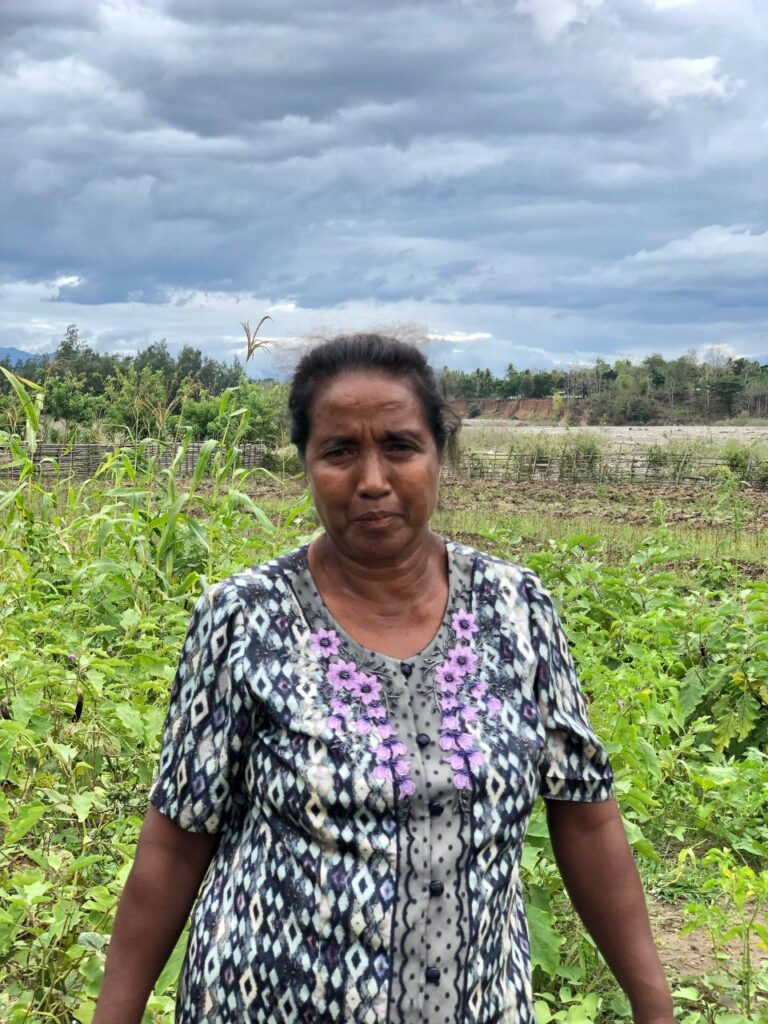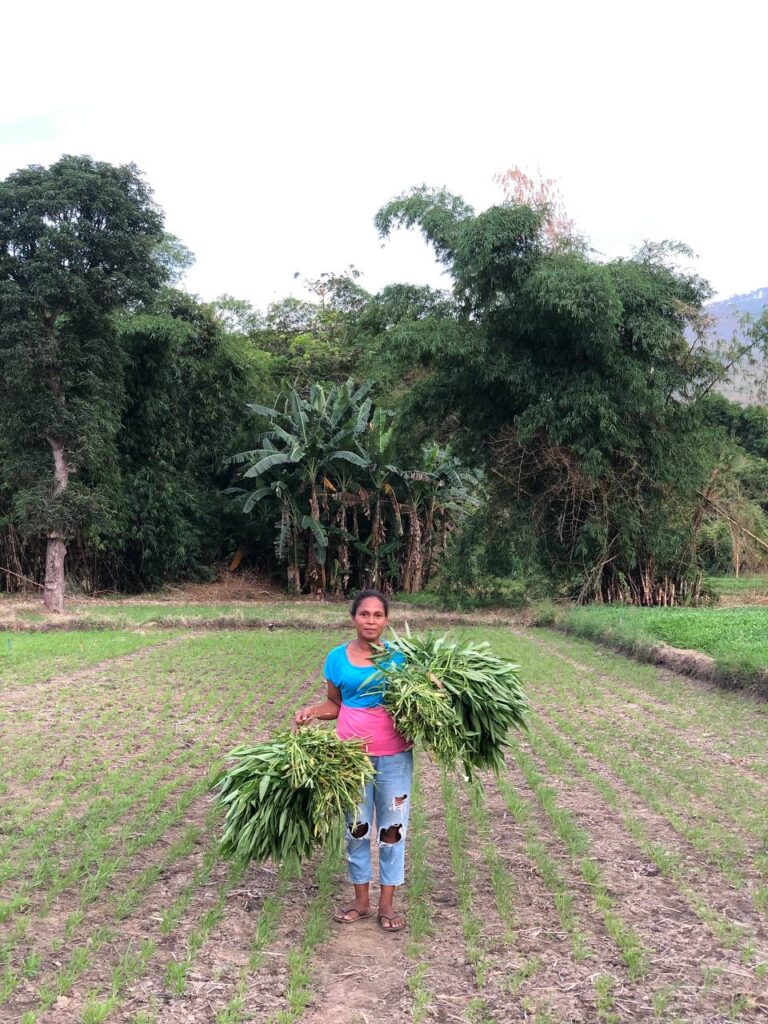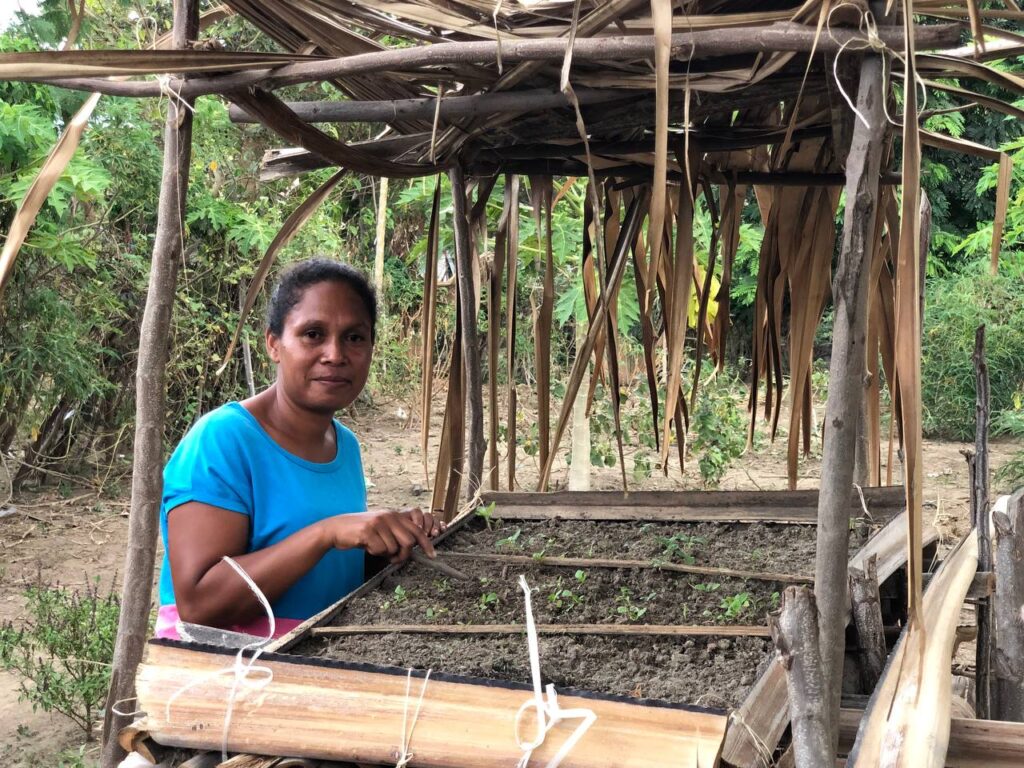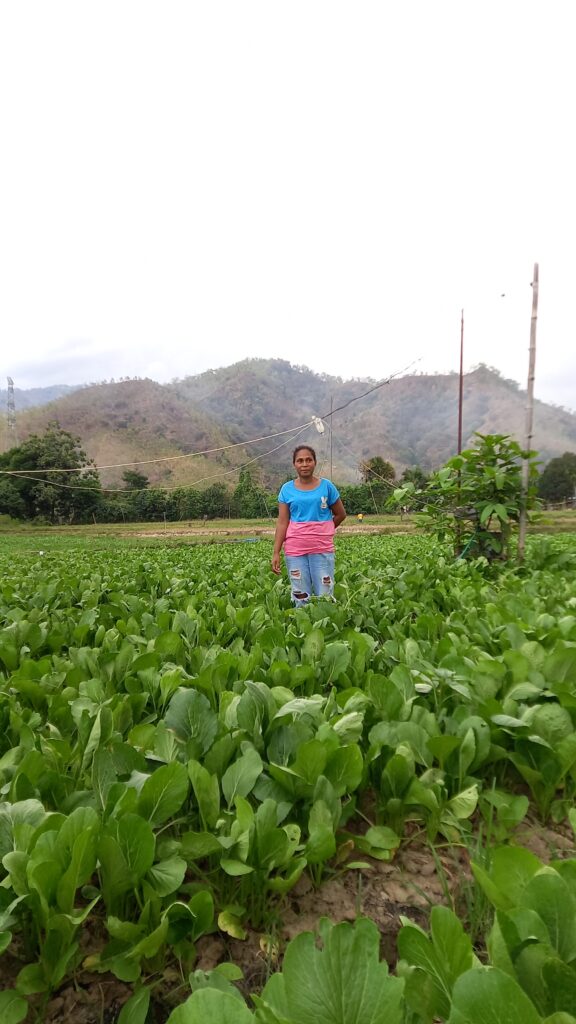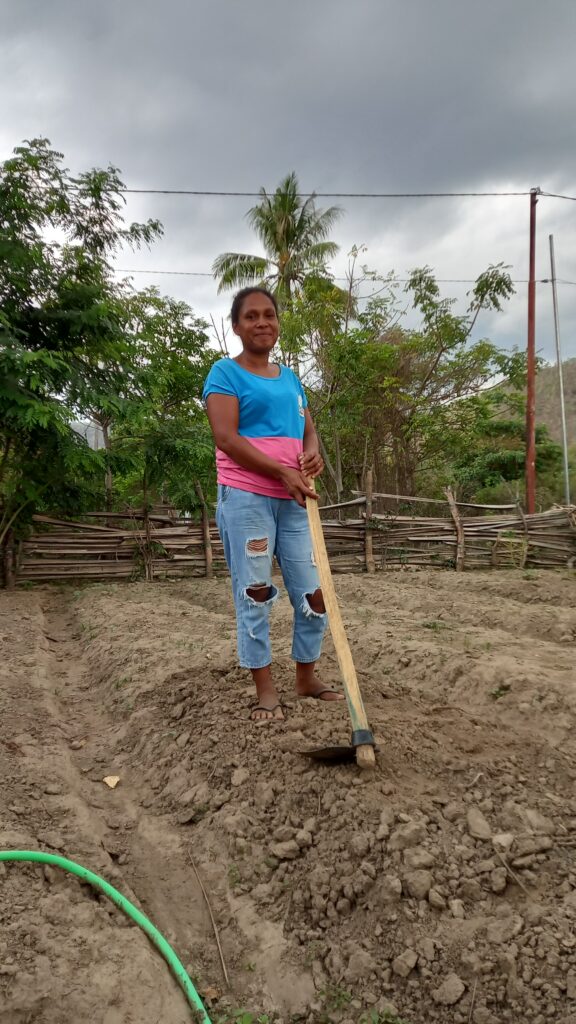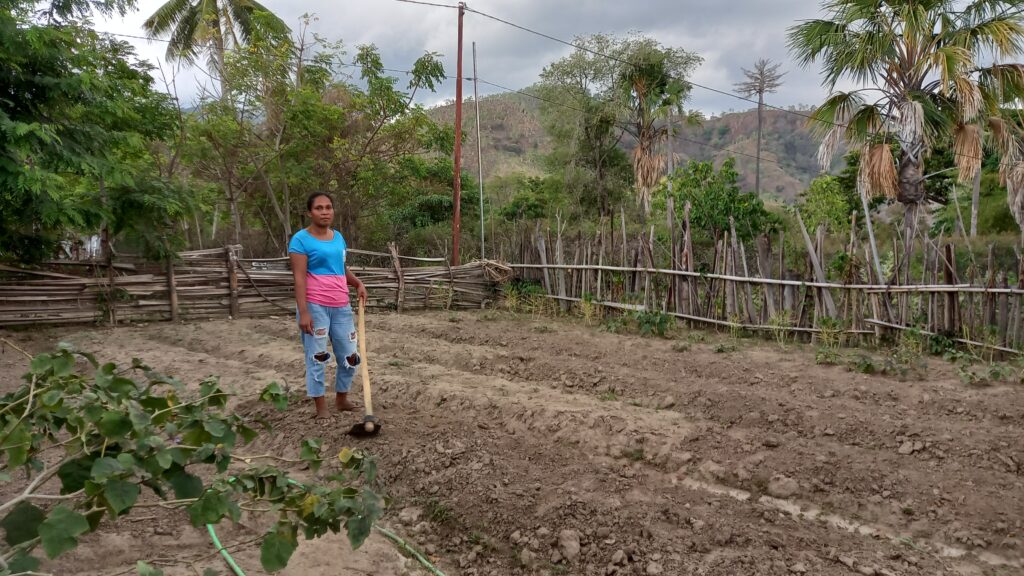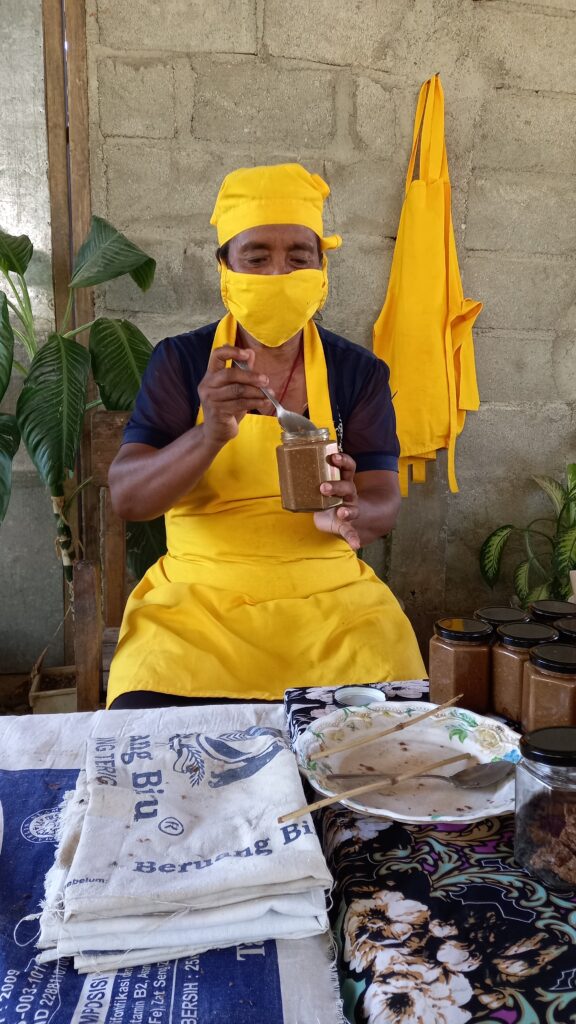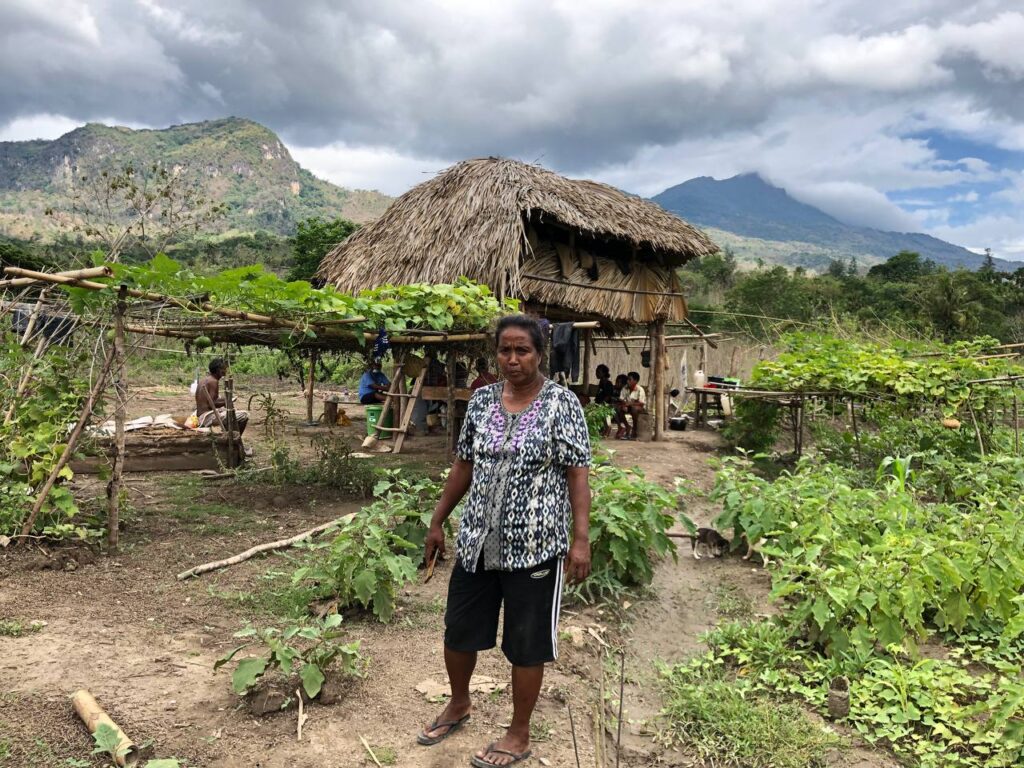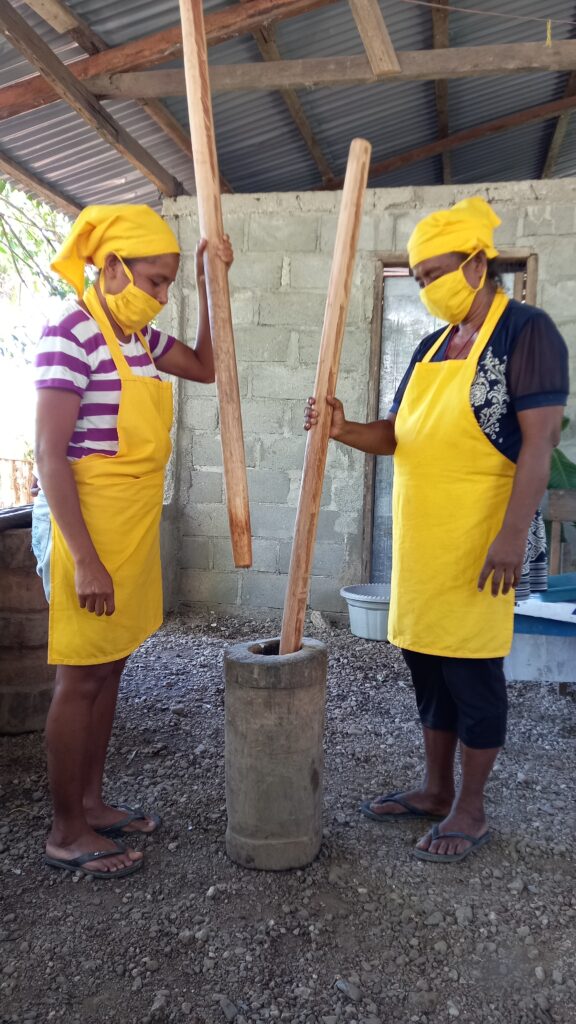Selebrasaun Loron Internasionál Feto Rurál, 15 Outubru 2022
Iha biban ne’e Projetu Hakbiit Feto ne’ebé hetan apoiu finanseiru husi Uniaun Europeia no finansia hamutuk hosi ADRA Austria ne’ebé implementa iha parseria ho Rede Feto Timor-Leste hasoru malu no dada lia ho feto agrikultór forte na’in rua, Sra. Rosa Gama husi munisípiu Bobonaro no Sra. Emelda da Silva Pinto husi munisípiu Dili hodi fahe sira-nia esperiénsia ho feto maluk sira seluk iha rai laran.
Aleinde hala’o knaar hanesan agrikultór no fa’an produtu lokál, agora daudaun mós partisipa hanesan iha programa Eskola Kampu no Klimátika ba Agrikultór sira ne’ebé ADRA Timor-Leste mak implementa liuhusi Projetu Hakbiit Feto. Sira informa katak sira kontente tanba liuhusi selebrasaun loron feto rurál ne’e hanesan oportunidade di’ak ida iha ne’ebé fó biban atu ema bele rona feto sira-nia lian, aumezmu tempu sira sente orgullu tanba ida-ne’e hanesan símbolu valorizasaun ida ba kontribuisaun husi feto rurál sira ba família no ba nasaun.
Sra. Rosa Gama, ho idade 48, husi Postu Administrativu Caicalo, Munisípiu Bobonaro hato’o katak loro-loron nia ho nia kaben hala’o servisu hanesan agrikultór, no sira-nia atividade prinsipál mak kuda modo, fore-rai, fore-mungu, xá roccella, no agora daudaun mós kuda batar midar ne’ebé hetan apoiu fini husi ADRA Timor-Leste atravez husi parseiru implementadór Fundasaun Haburas Moris (FHM). Nia hatutan tan katak agora daudaun nia lidera hela grupu ki’ik ida ne’ebé mesak feto hodi prodús manteiga fore-rai ne’ebé baibain fa’an direita ba kompañia PARCIC, hafoin distribui fila fali ba loja sira iha Maliana, Timor Plaza, supermerkadu sira, no mós loja Aroma Timor. Osan ne’ebé sira hetan husi negósiu ne’e uitoan mak sira fahe ba malu no barak liu mak sira rai iha kaixa grupu nian hodi uza fali ba sosa fore-rai no botir ba tau produtu manteiga. Aleinde ne’e sira mós prodús xá rochella ne’ebé membru ida-idak kuda no rendimentu depende ba membru ne’ebé badinas kuda no prodús. Nia haktuir katak bainhira sira distribui marmelada to’o botir 100 ou liu bele hetan rendimentu to’o $.450.00 iha kada tranzasaun ne’ebé konsidera natoon hodi kontribui ba nesesidade família nian.
Nia informa liután katak iha hala’o atividade refere sira enfrenta mós dezafiu oioin no iha komunidade balu mak hateten katak feto la presiza servisu maka’as hanesan halo to’os depois halo tan negósiu tanba ne’e mane sira-nia responsabilidade maibé nia enkoraja nafatin feto maluk sira katak ita feto presiza hamriik ho ain rasik. Importante mak buat saida de’it ne’ebé ita halo bele haforsa liután ita-nia família. “Tempu agora iha tentasaun oioin no iha kualkér tempu bele akontese buat ne’ebé ita la espera no bainhira ita la prontu to’o tempu ruma ita labele halo servisu mesak, Rosa hatutan.
Iha ámbitu selebrasaun ida-ne’e nia apela ba feto maluk sira hotu iha Timor laran tomak katak, servisu hotu-hotu ne’ebé feto bele halo di’ak liu halo no labele hein de’it mane, tanba feto mós bele no baibain ema dehan katak feto forte nasaun mós forte. “Baibain violénsia mosu iha uma laran tanba buat hotu depende de’it ba mane, entaun feto la forte atu foti ka hola desizaun ruma tanba buat hotu-hotu hein de’it husi mane. Entaun ha’u apela ba feto maluk sira iha Timor laran tomak katak tempu to’o ona atu feto mós foti desizaun, no feto mós bele lidera, no labele depende de’it ba mane, tanba importante mós ba feto atu hola papél hodi apoia família uma laran, no kontribui mós ba Nasaun. Ha’u fiar katak bainhira ita hotu halo hanesan ne’e sei redús violénsia doméstika iha uma laran no família sei sai forte no ema hotu sei hetan oportunidade hanesan atu hala’o kualkér atividade’, Rosa .
Iha parte seluk, Sra. Emelda da Silva Pinto, inan ida ho idade 39, husi Hera, Munisípiu Dili informa katak loroloron nia hala’o knaar aleinde hanesan dona de kaza, nia mós hala’o atividade hanesan agrikultór kuda modo no hodi modo ba fa’an iha merkadu iha Dili laran. Atu lori nia modo ba merkadu iha Dili, nia tenke aluga transporte publiku no selu ho osan bazeia ba modo ne’ebé nia iha. Nia esplika katak kada modo futun boot ida tenke selu ho osan $.0.50 sentavus, no karik lori to’o futun 40 tenke selu ho osan $.20.00 iha viajen dala ida. Nia hatutan tan katak hala’o atividade ida-ne’e kada loron bele hetan osan husi $.15.00 – $.35.00 ne’ebé natoon atu hatán ba nesesidade família no mós ba oan sira-nia eskola.
Mezmu nune’e, nia mós hasoru dezafiu hanesan modo hetan estragus husi ular no mós bainhira modo tama barak liu iha merkadu entaun ema la sosa no karik sosa ho presu ne’ebe ki’ik liu no osan ne’e tenke fahe ho karreta na’in. Bainhira modo la folin tenke lori fila ou se lae soe de’it maibé tenke korajen nafatin atu nune’e bele hatudu katak feto mós bele no la depende de’it ba mane sira. “Bainhira ita tuur de’it iha uma ita-nia moris sei depende tomak ba mane sira no ita sei lakon oportunidade no ikus moris la kontente tanba lakon respeitu iha família laran,” Emelda hatutan.
Nia hatutan tan katak nia hala’o atividade ida-ne’e durante tinan tolu ona, no hetan apoiu maka’as tebes husi nia kaben mane no viziñu sira tanba viziñu hotu-hotu sempre ajuda malu ba atividade sira hanesan hamoos du’ut, kuda modo, koleta no hamoos modo bainhira atu lori ba fa’an.
Nia informa liután katak nia sente orgullu no kontente bele partisipa mós iha programa Eskola Kampu & Klimátika ba Agrikultór sira ne’ebé introdús husi ADRA tanba bele aprende oinsá prodús rasik adubus no pestisida orgániku no oinsá kuda modo ho di’ak. Ida-ne’e di’ak tebes ba sira tanba durante ne’e sira sempre sosa de’it adubus orgániku sira, afinál fasil tebes atu prodús ho material lokál hirak-ne’ebé ita iha.
“Ha’u sente kontente tanba liuhusi selebrasaun loron internasionál feto rurál nian ba tinan ida-ne’e ha’u bele hetan oportunidade atu fahe ha’u-nia esperiénsia ho feto maluk sira seluk. Ha’u fiar katak ida-ne’e bele sai hanesan ezemplu ida-ne’ebé bele motiva feto maluk sira atu hanoin halo buat ruma hodi ajuda mane sira kontribui ba sira-nia ekonomia família nian,” Emelda reforsa.
Iha ámbitu selebrasaun ida-ne’e nia husu ba feto maluk sira atu esforsu maka’as hodi halo saida de’it mak ita bele naran katak bele kontribui ba hasa’e ekonomia família nian hodi hamenus dependénsia ba mane sira tanba situasaun hanesan ne’e bele kontribui ba violénsia doméstika. Nia mós husu ba aman ka kaben mane sira atu kompriende sira-nia kaben feto sira no fó oportunidade ba sira atu halo netik atividade ruma hodi apoia ba ekonomia família nian.
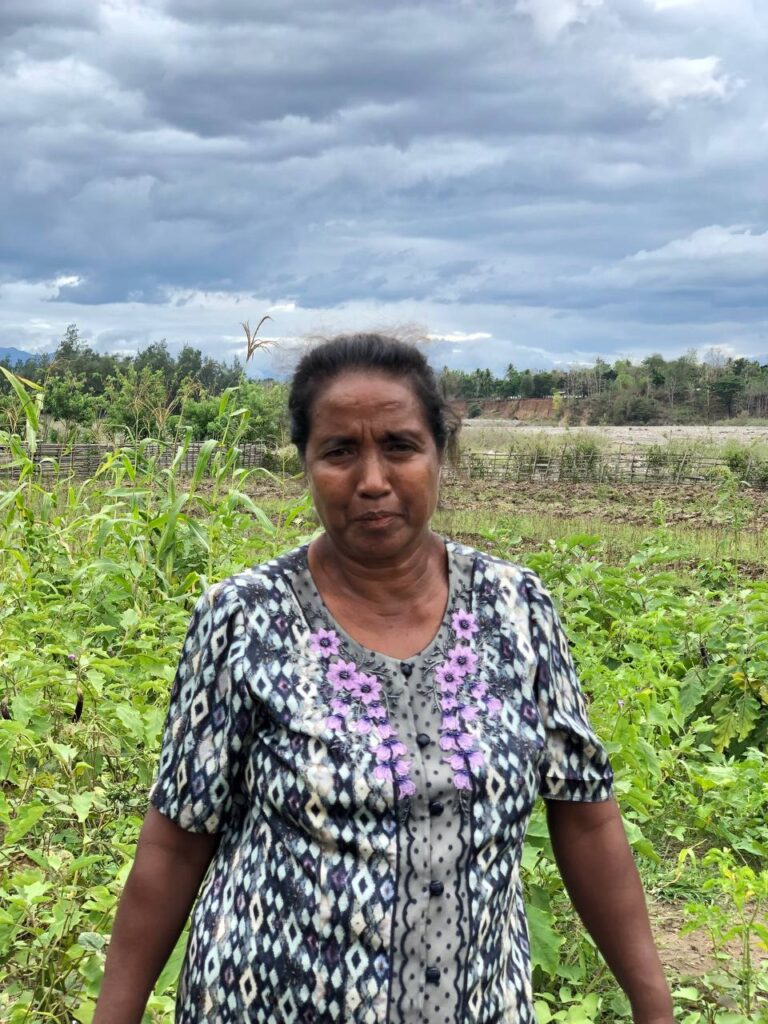
Projetu Hakbbit Feto:
Celebration of International Rural Women’s Day, 15 October 2022
Today, Saturday, 15th October 2022 is the celebration of International Rural Women’s Day. In Timor-Leste, we celebrate this international day with the national theme “Promoting Value Chain to Ensure Rural Women’s Products for Sustainability of Family Economic.”
On this opportunity, the Hakbiit Feto Project, which is funded by the European Union and Co-funded by ADRA Austria, a[1]nd implemented in partnership with Rede Feto Timor-Leste, met with two strong female farmers, Mrs. Rosa* from Bobonaro and Mrs. Emelda* from Dili municipalities to share their experiences with other female colleagues within the country.
They are currently participating in the Farmer Field and Climate School programme implemented by ADRA Timor-Leste through Hakbiit Feto Project. They informed that they feel happy because the celebration of the Rural Women’s Day is a good opportunity to enable the people to hear the voice of the women. At the same time, they feel proud because it is a symbol of valuing rural women’s contributions to both the family and the country.
Ms. Rosa, 48 years of age, from the Caicalo Administrative Post, Bobonaro Municipality, says that her husband and herself work as farmers every day. They are growing vegetable, peanuts, mung beans, rosella tee, and currently planting sweet corn with the seeds supported by ADRA Timor-Leste through the implementing partner of the Haburas Moris Foundation (FHM).
She added that she is currently leading a small group of women who producing butter from peanuts, which is usually sold directly to PARCIC, then distributing to shops in Maliana, Timor Plaza, supermarkets, and the Aroma Timor store. The money earned from this activity they shared a few among the members and most of it saved as the group’s cash to be used to buy peanuts and bottles for the putting the butter. In addition, they produce tea from rosella that each member planted and the income depends on the number of rosella planted and how much tea they produced. She added that they can earn more than $.450.00 in each transaction if they can produce and distribute up to 100 bottles of peanut butter. This amount is considered sufficient to contribute to the needs of the family.
She explained that they faced many challenges in running this activity and some community members told them that women don’t need to do hard work like farming and running businesses because it is the responsibility of men. But she continues to encourage her fellow women that women need to stand on our own feet, and the important thing is that whatever we do could contribute to strengthen our family. “There are many temptations nowadays. Anything might happen at any time, and if we are not prepared, we cannot work independently,” Rosa added.
For the context of this celebration, she appealed to every women around Timor-Leste to do whatever they can and must not rely only on men because women also can do the best, as there is saying strong women, strong nation. “Usually, domestic violence occurs within the family as the result of being fully dependent to men. Then women have no power to take any decision and fully depend on men. Therefore, I would like to call on to all Timorese women that it is now the time for women to take decision, that the women can lead, and must not fully dependent to men as it is important for the women to take the role to support the family and contribute to the country. I believe that by doing so, will reduce domestic violence, the family will be strengthened, and everyone will have equal opportunity to do any activities,” Rosa reinforced.
Mrs. Emelda, a 32 year old woman from Hera, Dili municipality, informed that she is doing farming to plant vegetable and selling vegetable at the markets in Dili, before the main responsibility as a housewife. She must hire the public transport to bring her vegetable to the market in Dili, and she must pay $.0.50 cents per a big sheaf or a sack. She must pay $20.00 for one way trip, if she carries up to 40 sheaves or sacks of vegetable. She added that every day she can earn up to $.15.00 – $.35.00 to respond to her family needs and her children’s school needs.
Nevertheless, there are many challenges she faces such as insects damaged vegetables and sometimes people do not buy because lots of vegetables already in the market. She has to bring them back or otherwise throwed away, but she keeps motivated to demonstrate that women also can do the best and should not be dependent to men only. “If we just sit at home, our live will be dependent to men and we will lose the opportunity and in the end we will not be happy due to not been respected within the family,” said Emelda.
She added that she has been doing this activity for three years and received great support from her husband and neighbours, as we always assist each other with the same activities such as weeding, planting vegetables, harvesting and cleaning of vegetables to be brought and sold at the market.
She stated that she is proud and happy to participate in the Farmer Field & Climate School (FFS) programme, which introduced by ADRA where they could learn how to produce organic fertilizer and pesticides and how to plant vegetable in a good manner. This is very good for her because they always bought only organic fertilizers at the shop, in fact it was very easy to produce with the available local materials that we have.
“I am delighted with the celebration of International Rural Women’s Day this year; I got the opportunity to share my experiences with other female colleagues. I believe that this can be an example that could motivates them to take the initiatives to do something and contribute to their own family economic,” added Emelda.
Within this celebration, she calls on to every woman to put more effort to do whatever we can do to contribute to the growth of the family economy in order to reduce dependency to men because such situations could lead to domestic violence. She also calls to every father or husband to understand their wife and give opportunity for them involve in any activities that could contribute to the family economic. He also asked the husband and father to understand their wife and give them the opportunity to interact with activities to support the family economy.
Hakbiit Feto Project:
[1] * Names have been changed for privacy


